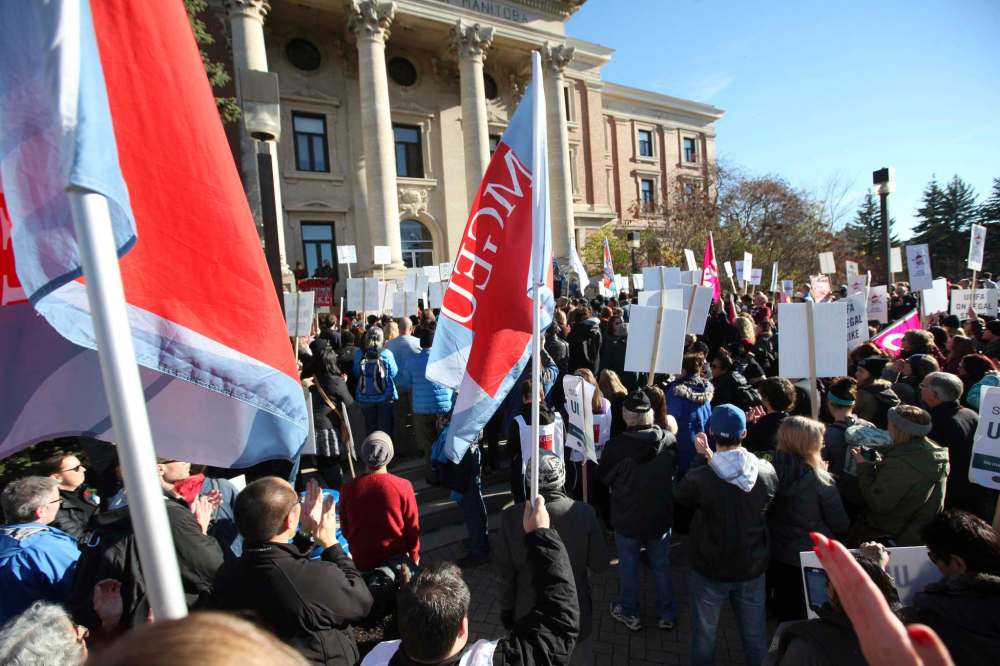Tories interfered with U of M contract talks, court rules
Advertisement
Read this article for free:
or
Already have an account? Log in here »
To continue reading, please subscribe:
Monthly Digital Subscription
$0 for the first 4 weeks*
- Enjoy unlimited reading on winnipegfreepress.com
- Read the E-Edition, our digital replica newspaper
- Access News Break, our award-winning app
- Play interactive puzzles
*No charge for 4 weeks then price increases to the regular rate of $19.00 plus GST every four weeks. Offer available to new and qualified returning subscribers only. Cancel any time.
Monthly Digital Subscription
$4.75/week*
- Enjoy unlimited reading on winnipegfreepress.com
- Read the E-Edition, our digital replica newspaper
- Access News Break, our award-winning app
- Play interactive puzzles
*Billed as $19 plus GST every four weeks. Cancel any time.
To continue reading, please subscribe:
Add Free Press access to your Brandon Sun subscription for only an additional
$1 for the first 4 weeks*
*Your next subscription payment will increase by $1.00 and you will be charged $16.99 plus GST for four weeks. After four weeks, your payment will increase to $23.99 plus GST every four weeks.
Read unlimited articles for free today:
or
Already have an account? Log in here »
Hey there, time traveller!
This article was published 14/10/2021 (1524 days ago), so information in it may no longer be current.
A Manitoba Court of Appeal judge has reinforced a 2020 ruling that found the provincial government “substantially interfered” with contract negotiations five years ago between the University of Manitoba and the union that represents its academics.
In an appeal decision published Wednesday, a three-judge panel sided with the province in overturning a Manitoba Court of Queen’s Bench ruling that deemed the 2017 wage freeze legislation, the Public Services Sustainability Act unconstitutional.
Chief Justice Richard Chartier and his colleagues, however, upheld a judge’s conclusion that the province violated professors’, instructors’ and academic librarians’ rights to freedom of association, when it secretly handed their employer a salary mandate in 2016.

“Manitoba’s conduct not only significantly disrupted the balance between the U of M and UMFA, but also significantly damaged their relationship, thereby seriously undermining what had been a meaningful and productive process of good faith collective bargaining,” Chartier wrote in his decision.
The judge countered the province’s argument that a mandate was simply provided to the university late in its bargaining process.
Per the decision, the province got involved in the matter in October 2016 after learning the university had put forward a proposal to have academics’ wages increase by seven per cent over four years.
It was then the province directed U of M to bargain for a one-year agreement with a zero per cent hike because it was concerned the offer would create a bad precedent, wrote Chartier, adding Manitoba ordered the university not to disclose to the union where the mandate had come from.
Although the university disagreed with the mandate, given the parties had engaged in more than 20 bargaining sessions, the decision states administration abided by the mandate because it was told there would be “financial consequences” if it did not follow through.
The union, which represents 1,200 employees, launched a three-week-long strike when it was informed of the mandate during mediation.
The association, which says wages have been frozen since 2016, is holding another strike vote this weekend. Members claim the provincial government is still interfering in contract talks, which has worsened recruitment and retention problems at U of M.
“The PC government needs to learn from the mistakes of the past, stop interfering in our bargaining, and let us come to a free and fair deal,” said Orvie Dingwall, president of the faculty association, in a prepared release on the latest ruling.
A university spokesperson indicated Thursday the administration continues to bargain in good faith and has put forward a new proposal that recognizes its commitment to making faculty salaries more competitive with comparable universities.
Myrrhanda Novak, executive director of public affairs at U of M, said the school has proposed a four-year contract with annual increases of one per cent, one per cent, 1.25 per cent, and 1.25 per cent, in addition to structural changes to enhance pay scales for new employees.
maggie.macintosh@freepress.mb.ca
Twitter: @macintoshmaggie

Maggie Macintosh reports on education for the Winnipeg Free Press. Funding for the Free Press education reporter comes from the Government of Canada through the Local Journalism Initiative.
Our newsroom depends on a growing audience of readers to power our journalism. If you are not a paid reader, please consider becoming a subscriber.
Our newsroom depends on its audience of readers to power our journalism. Thank you for your support.

